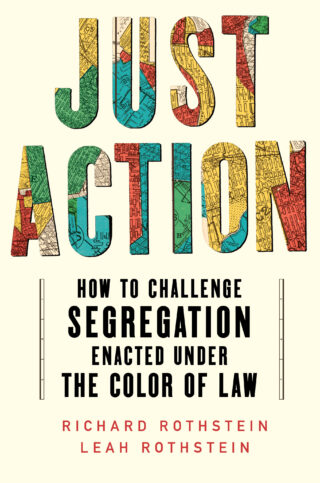Don’t let businesses off the hook: The government’s role in creating segregation does not exonerate the private sector
A Wall Street Journal op-ed claims that private markets and capitalism have no responsibility for remedying racial segregation and the authors cite my previous book The Color of Law to back up their claims. While my book exposed the forgotten history of how government policy created segregation, that doesn’t mean the market was blameless in this apartheid and should get a free pass, as the Journal authors argue.
“The answer isn’t to place the burden on the market. It’s to root out bad government policies,” write David Henderson and Phillip Magness—who work at conservative policy centers (the Hoover Institution and the American Institute for Economic Research, respectively).
Henderson and Magness, however, identify no particular government policies whose rooting out would redress segregation while simultaneously avoiding a burden on markets. More to the point, however, they ignore the enormous responsibility for segregation that the private sector also bears, and its obligation to participate in reform to a much greater extent than any business enterprise now contemplates.
The Color of Law uses Levittown, the 17,000-home post-World War II development east of New York City, to illustrate how public agencies suburbanized the nation on a segregated basis. The builder, William Levitt, could never assemble the capital for such an undertaking without federal guarantees for his bank loans. The government’s explicit requirement was that he never sell to African Americans and that he place into house deeds a prohibition on future resales or rentals to them.
But Levitt was himself a bigot. He announced that left to his own devices, his company would never sell to Black buyers. Yet if the Federal Housing and Veterans administrations had fulfilled their legal responsibilities, they would have told Levitt he could either sell on a non-discriminatory basis or not at all. That’s why our system of residential segregation is both unlawful and unconstitutional.
The private sector imposed racial exclusion in many communities long before the 1930s when government first got involved in the housing market. Researchers in communities around the country have identified racially restrictive deed clauses, as in Levittown, that were inserted by banks, developers, and real estate agents without being required to do so by the government. The language flouted civil rights laws dating to 1866. Federal authorities and the courts failed to enforce those laws, but violations were within the private sector’s sole discretion.
In a new book, Just Action, coauthored by myself and my daughter Leah Rothstein, we describe how banks financed speculators who exploited African Americans by marketing homes to them on “contract” for prices many times what the sellers had paid for the properties only weeks before, taking advantage of the same banks’ refusal to issue conventional mortgages to Black buyers. There was no government involvement in this scheme, except for a refusal to enforce civil rights laws that prohibited such actions.

For geographically diverse cities—Baltimore, Charlottesville, Chicago, Rochester, San Mateo—Just Action names the specific banks, realtors, developers, newspapers, and insurance companies that committed these crimes. Where these businesses were subsequently merged into or acquired by larger enterprises, we identify the successor firms and assert that they not only inherited financial liabilities of companies they absorbed, but moral responsibilities as well.
In 1948, the Supreme Court prohibited state and federal courts from ordering the eviction of Black households that purchased homes in violation of a racial deed. Just Action describes how, in response, the real estate industry launched a national campaign for a constitutional amendment to permit racial discrimination in the sale and rental of housing.
The California real estate association explained that the amendment was necessary because “prices of homes in [white] areas are well within the purchasing power of vast numbers of Negroes… [and this] greatly aggravates the hazard to which [white] homeowners are exposed… [T]he insistence of some Negroes [to move to affordable neighborhoods will] do much harm to our national social structure.”
Government had nothing to do with this campaign. Throughout the nation, local real estate boards led efforts to defeat state and local legislation to ban housing discrimination. Builders on their own, without any government subsidies, excluded Black buyers from newly constructed subdivisions. Newspapers supported the practices by publishing advertisements for “restricted” projects.
Some enterprises that Just Action demonstrates share responsibility for segregation have responded to their legacies by creating “diversity, equity, and inclusion” departments that promote hiring more Black employees and urging an end to ongoing discriminatory practices. In a few cases, banks have established modest down payment assistance programs that help a few African Americans buy homes, usually in low-income segregated neighborhoods. Much more is needed, specifically large financial contributions to give vast numbers of Black households access to whites-only areas that, when built, were ‘well within their purchasing power’ but that now, after decades of property appreciation, are no longer affordable to middle-class families.
Unlike the Wall Street Journal writers, Just Action does not hesitate to name specific government policies that perpetuate segregation; it shows how a new civil rights movement can organize to root them out. But we also identify the private institutions that collaborated with public policy to create an apartheid landscape, and why a racial justice movement should campaign to compel participation by business as well.
Government and the private sector created and sustain segregation and both should step up to redress it.
This blog is a slightly edited version of the “Just Action” Substack column of Leah Rothstein and Richard Rothstein. You can subscribe here. Richard Rothstein is an Economic Policy Institute distinguished fellow.
Enjoyed this post?
Sign up for EPI's newsletter so you never miss our research and insights on ways to make the economy work better for everyone.